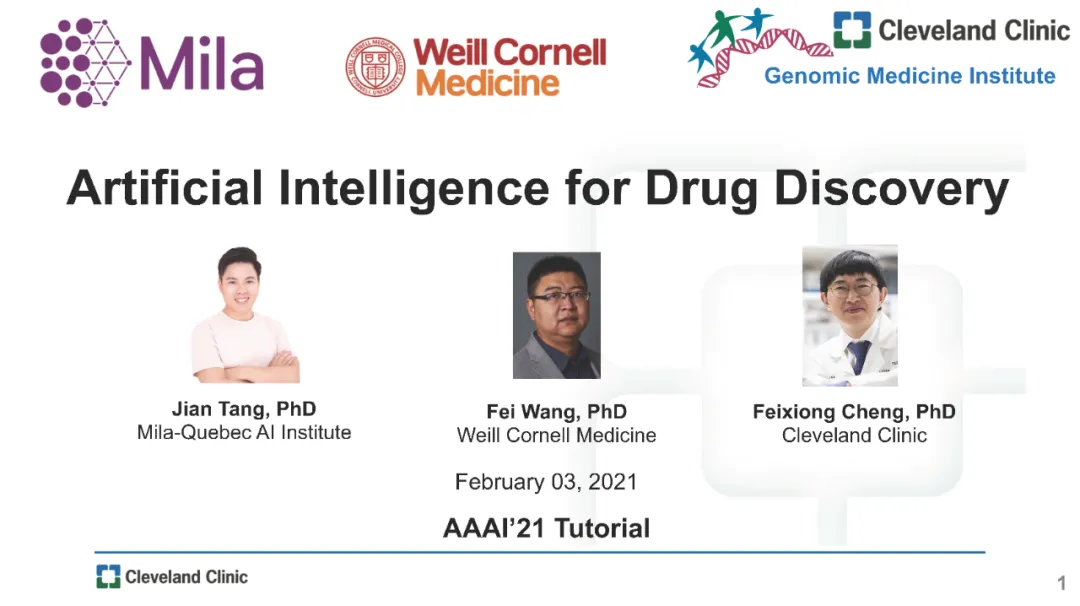【导读】国际人工智能会议AAAI 2021论文将在全程线上举办,时间在 2 月 2 日-2 月 9 日,本届大会也将是第 35 届 AAAI 大会。大会涵盖了众多最近研究进展报告,来自MIla唐建博士、FeiWang博士、Feixiong Cheng共同做了关于人工智能药物发现的进展报告,非常值得关注!
药物发现是一个漫长而昂贵的过程,平均需要10年时间和25亿美元来开发一种新药。人工智能有潜力通过分析生物医学领域产生的大量数据,如生物测定、化学实验和生物医学文献,来显著加速药物发现的进程。最近,在许多不同的领域,包括机器学习、数据挖掘和生物医学领域,人们对开发人工智能技术用于药物发现越来越感兴趣。在本教程中,我们将详细介绍药物发现中的关键问题,如分子性质预测、新生分子设计和分子优化、反合成反应和预测、药物再利用和组合,以及针对这些问题的人工智能关键技术进展。本教程可以作为对药物发现感兴趣的计算机科学家和药物发现从业者的入门材料,以便沿着这个方向学习最新的人工智能技术。
AAAI 2021:https://deepgraphlearning.github.io/DrugTutorial_AAAI2021/ KDD 2021: https://deepgraphlearning.github.io/DrugTutorial_KDD2021/
目录:
-
药物概述 Drug Discovery Overview [20 min, presented by Feixiong]
-
深度学习,传统基于网络方法,图表示学习 Deep Learning, Traditional Network-based Methods, Graph Representation Learning [15 min, presented by Fei]
- 卷积神经网络与循环神经网路络 Convolutional Neural Networks and Recurrent Neural Networks
- 图卷积网络 Graph Convolutional Networks [GCN (Kipf & Welling, 2016), MPNN (Gilmer et al., 2017), GIN (Xu et al., 2018)]
-
分子性质预测 Molecule Properties Prediction [30 min, presented by Jian]
- Supervised [MPNN (Gilmer et al., 2017)]
- Self-supervised [ContextPred (Hu et al., 2019), InfoGraph (Sun et al., 2020)]
- Semi-supervised [InfoGraph (Sun et al., 2020)]
-
新生分子的生成和优化,De novo Molecule Generation and Optimization [40 min, presented by Jian and Fei]
- Variational autoencoder-based approach [JTVAE (Jin et al., 2018)]
- Autoregressive methods [GCPN (You et al., 2018)]
- Normalizing Flow-based approaches [GraphAF (Shi et al., 2020), MoFlow (Zang & Wang, 2020)]
-
反应预测与反合成,Reaction Prediction and Retrosynthesis [30 min, presented by Jian]
-
Reaction prediction [(Jin et al., 2017), (Schwaller et al., 2019), (Sacha et al., 2020)]
-
Retrosynthesis [(Dai et al., 2019), (Shi et al., 2020), (Sacha et al., 2020)]
-
基于多组学和临床数据的药物再利用,Multiomics and Clinical Data-based Drug Repurposing [45 min, presented by Feixiong and Fei]
-
Network-based approach [(Cheng et al., 2018)]
-
Graph Neural Network-based approach [(Gysi et al., 2020) ]
-
Case Study on COVID-19 [(Zhou et al., 2020), (Gysi et al., 2020)]
-
其他话题,Other Topics [15 min, presented by Fei]
-
结论与未来方向,Conclusion and Future Directions [15 min, presented by Fei]
讲者:
唐建,加拿大蒙特利尔学习算法研究院 (MILA) 以及加拿大蒙特利尔大学商学院助理教授、博士生导师。主要研究方向为:图表示学习、图研究网络、知识图谱、药物发现。曾获得机器学习顶级会议ICML2014的最佳论文以及数据挖掘顶级会议WWW‘16的最佳论文提名。发表了一系列在图表示学习领域的经典论文包括LINE、LargeVis、RotatE以及最近的Graph Markov Neural Networks (GMNN)。
Fei Wang,美国康奈尔大学威尔医学院副教授,主要研究方向为数据挖掘及其在健康数据科学中的应用。他在人工智能和医学领域发表了250多篇论文,被引用超过1.27万次,H指数是56。他的论文在数据挖掘和医学信息学的顶级国际会议上获得了8项最佳论文奖。
https://wcm-wanglab.github.io/index.html
Feixiong Cheng博士,克利夫兰诊所基因组医学研究所的首席研究员。郑博士致力于开发计算和实验网络医学技术,以促进疾病异质性的表征,从而接近协调的、以患者为中心的战略的目标,以创新诊断和治疗的发展。
https://www.lerner.ccf.org/gmi/cheng/
参考文献:
Sun, F.-Y., Hoffmann, J., Verma, V., & Tang, J. (2020). Infograph: Unsupervised and semi-supervised graph-level representation learning via mutual information maximization. ICLR.
Shi, C., Xu, M., Zhu, Z., Zhang, W., Zhang, M., & Tang, J. (2020). GraphAF: a flow-based autoregressive model for molecular graph generation. ICLR.
Shi, C., Xu, M., Guo, H., Zhang, M., & Tang, J. (2020). A Graph to Graphs Framework for Retrosynthesis Prediction. ICML.
Gottipati, S. K., Sattarov, B., Niu, S., Pathak, Y., Wei, H., Liu, S., Thomas, K. M. J., Blackburn, S., Coley, C. W., Tang, J., & others. (2020). Learning To Navigate The Synthetically Accessible Chemical Space Using Reinforcement Learning. ICML.
Jin, W., Barzilay, R., & Jaakkola, T. (2018). Junction tree variational autoencoder for molecular graph generation. ICML.
You, J., Liu, B., Ying, Z., Pande, V., & Leskovec, J. (2018). Graph convolutional policy network for goal-directed molecular graph generation. Advances in Neural Information Processing Systems, 6410–6421.
Zang, C., & Wang, F. (2020). MoFlow: An Invertible Flow Model for Generating Molecular Graphs. Proceedings of the 26th ACM SIGKDD International Conference on Knowledge Discovery & Data Mining, 617–626.
Sun, M., Zhao, S., Gilvary, C., Elemento, O., Zhou, J., & Wang, F. (2020). Graph convolutional networks for computational drug development and discovery. Briefings in Bioinformatics, 21(3), 919–935.
Hu, W., Liu, B., Gomes, J., Zitnik, M., Liang, P., Pande, V., & Leskovec, J. (2019). Strategies for Pre-training Graph Neural Networks. ArXiv Preprint ArXiv:1905.12265.
Gilmer, J., Schoenholz, S. S., Riley, P. F., Vinyals, O., & Dahl, G. E. (2017). Neural message passing for quantum chemistry. ArXiv Preprint ArXiv:1704.01212.
Kipf, T. N., & Welling, M. (2016). Semi-supervised classification with graph convolutional networks. ArXiv Preprint ArXiv:1609.02907.
Xu, K., Hu, W., Leskovec, J., & Jegelka, S. (2018). How powerful are graph neural networks? ArXiv Preprint ArXiv:1810.00826.
Jin, W., Coley, C., Barzilay, R., & Jaakkola, T. (2017). Predicting organic reaction outcomes with weisfeiler-lehman network. Advances in Neural Information Processing Systems, 2607–2616.
Schwaller, P., Laino, T., Gaudin, T., Bolgar, P., Hunter, C. A., Bekas, C., & Lee, A. A. (2019). Molecular transformer: A model for uncertainty-calibrated chemical reaction prediction. ACS Central Science, 5(9), 1572–1583.
Sacha, M., Błaż, M., Byrski, P., Włodarczyk-Pruszyński, P., & Jastrzębski, S. (2020). Molecule Edit Graph Attention Network: Modeling Chemical Reactions as Sequences of Graph Edits. ArXiv Preprint ArXiv:2006.15426.
Dai, H., Li, C., Coley, C., Dai, B., & Song, L. (2019). Retrosynthesis prediction with conditional graph logic network. Advances in Neural Information Processing Systems, 8872–8882.
Zhou, Y., Hou, Y., Shen, J., Huang, Y., Martin, W., & Cheng, F. (2020). Network-based drug repurposing for novel coronavirus 2019-nCoV/SARS-CoV-2. Cell Discovery, 6(1), 1–18.
Zeng, X., Zhu, S., Liu, X., Zhou, Y., Nussinov, R., & Cheng, F. (2019). deepDR: a network-based deep learning approach to in silico drug repositioning. Bioinformatics, 35(24), 5191–5198.
Zhou, Y., Wang, F., Jian, T., R., N., & Cheng, F. (2020). Artificial Intelligence in Drug Repurposing. The Lancet Digital Health.
Chen, H., Cheng, F., & Li, J. (2020). iDrug: Integration of drug repositioning and drug-target prediction via cross-network embedding. PLoS Computational Biology, 16(7), e1008040.
Cheng, F., Kovács, I. A., & Barabási, A.-L. (2019). Network-based prediction of drug combinations. Nature Communications, 10(1), 1–11.
Cheng, F., Desai, R. J., Handy, D. E., Wang, R., Schneeweiss, S., Barabási, A.-L., & Loscalzo, J. (2018). Network-based approach to prediction and population-based validation of in silico drug repurposing. Nature Communications, 9(1), 1–12.
Gysi, D. M., Valle, Í. D., Zitnik, M., Ameli, A., Gan, X., Varol, O., Sanchez, H., Baron, R. M., Ghiassian, D., Loscalzo, J., & others. (2020). Network medicine framework for identifying drug repurposing opportunities for covid-19. ArXiv Preprint ArXiv:2004.07229.
Zhou, Y., Hou, Y., Shen, J., Kallianpur, A., Zein, J., Culver, D. A., Farha, S., Comhair, S., Fiocchi, C., Gack, M. U., & others. (2020). A Network Medicine Approach to Investigation and Population-based Validation of Disease Manifestations and Drug Repurposing for COVID-19. ChemRxiv.



